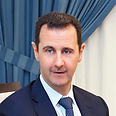
Bashar Assad
צילום: רויטרס
Attacks, scarcity push Syrian medical services to the brink
Dwindling number of doctors in war-torn country struggle to give care as number of injuries rises. 'Denial of medical care as weapon of war is distinct, chilling reality of the war in Syria,' UN rights body says
September has been an especially bad month for doctors and medical staff working in already difficult conditions inside Syria. Attacks on hospitals and their staff, and a general lack of facilities, mean medical care in Syria is at breaking point.
On Wednesday, Syrian Government forces bombarded the hospital in Al-Bab in the north of the country, killing 11 civilians, including a doctor. The strike also saw the destruction of a school in the town that was being used as the headquarters for the Islamic State of Iraq and al-Sham (ISIS), an extremist Islamic rebel group associated with al-Qaeda.
Related stories:
- Damascus clubbers dance on in bid to forget war outside
- Back to school in Syria as threat of US strike subsides
- UN: Homes, families, children are casualties in Syria
The strike coincided with the release of a report by the United Nations criticizing both sides of the conflict for blocking access to hospitals.
“The denial of medical care as a weapon of war is a distinct and chilling reality of the war in Syria,” the UN Commission of Inquiry monitoring human rights in Syria said in its report.
The report cited the targeting of hospitals in air attacks and the use of medical facilities by Syrian government forces as torture centers, namely Military Hospital No. 601 in Damascus, where “detainees, including children, have been beaten, burned with cigarettes and subjected to torture that exploits pre-existing injuries.”
Rebels were also blamed in the report, with the prominent Farouq Brigades’ attack on the national hospital in Homs in 2012 cited as one example.
Fifty-five doctors and medics, including two Nobel laureates, wrote an open letter this week demanding the situation for medical workers in the country improves, saying it “is at breaking point.” The group calls on the UN to provide more support and to the warring parties to cease attacks on medical facilities.
The destruction of 37 percent of hospitals in the country, and the damaging of an additional 20 percent, makes access to services difficult.
Of the 5,000 doctors in Aleppo, Syria’s largest city, prior to the war, the letter claimed that only 36 remain.
Doctors spoke to The Media Line at a field clinic in the capital city run by the Syrian Red Crescent and the Syrian American Medical Service. Hiding on the second floor because the third floor was within the line of a sniper position that shoots directly at the hospital, the doctors explained the dangerous circumstances in which they work.
Abu Muhammadeen, one of the surgeons, said the hospital was under-staffed and one doctor hadn’t been home to see his family in eight months.
“The first challenge is the number of surgeons,” he said. “There aren’t enough and we suffer from fatigue.”
Casualties were predominantly serious traumas and the hospital frequently became inundated with patients after an attack in the city. A lack of diagnostic equipment made the job of the two doctors on staff at any one time more difficult. In the absence of access to a blood bank, the fridge in the break room was used to store blood.
Doctors like those at the field hospital are constantly under threat, just for doing their jobs. On September 3, the body of Dr. Muhammad Abyad, 28, a surgeon who was working in an Aleppo hospital run by the French arm of Doctors Without Borders, was found.
The French group, called Medecins Sans Frontieres (MSF), is one of only a few medical services working within Northern Syria, and it is active in six hospitals and four health centers.
General Director Joan Tubau was outraged by the attack "against a young and highly motivated surgeon who was working to save the lives of Syrians affected by the conflict."
MSF would not go into detail about the circumstances surrounding the doctor’s death, but the Syrian Observatory of Human Rights issued a statement saying that the ISIS extremist group killed the man after abducting him from the village where he was working.
Under threat from all sides, medical workers continue to struggle to provide the services civilians so desperately need.
Article written by Emma Beals
Reprinted with permission from The Media Line










